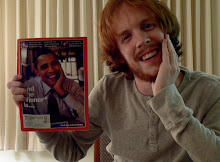
Something I'll bet you'd never find yourself thinking about (unless you are a Berkley film major, or me, or probably two of my professors):
What exactly were the subversive social codes incorporated into film noir movies of the 1940's & 50's?
Well, I'm not exactly thinking about that either, but I am prepping for a final paper on the modern femme fatale of neo noir, so I have film noir on the brain.
(I'm thinking about looking at Julianne Moore in The Big Lebowski, Carrie Anne Moss in Memento...any others?)
My teacher sent me a huge listing of academic articles on film noir, and I just feel that I need to share a few of the titles and authors that sounded awesome. You know, just in case you ever get the urge to find out more about this very specific genre of crime/detective film for some reason. Seems likely, non?
Really, check it out if you like film studies at all. Or American studies, ya know? Great resource, etc.
Some articles/essays that sound pretty neat:
Lott, Eric. "The Whiteness of Film Noir." In: National imaginaries, American identities: the cultural work of American iconography / edited by Larry J. Reynolds and Gordon Hutner. Princeton, N.J.: Princeton University Press, c2000.
- Telotte, J. P. "The woman in the door: framing presence in film noir." In: In the eye of the beholder: critical perspectives in popular film and television / edited by Gary R. Edgerton, et al. Bowling Green, OH: Bowling Green State University Popular Press, c1997.
- Thompson, Peggy. Hard-boiled: Great Lines From Classic Noir Films San Francisco: Chronicle Books, c1995.
- Avila, E. "Popular culture in the age of white flight: Film noir, Disneyland, and the cold war (sub)urban imaginary." Journal of Urban History, vol. 31, no. 1, pp. 3-22, 2004
Davidson, Michael. "Phantom Limbs: Film Noir and the Disabled Body." GLQ: A Journal of Lesbian and Gay Studies 9, no. 1 (2003): 57-77
- Jensen, Paul. "The Return of Dr. Caligari: Paranoia in Hollywood." Film Comment 7:4 (1971) pp:36-45
- Lenz, Kimberly. "Put the Blame on Gilda: Dyke-Noir Vesus Film-Noir" Theatre Studies, 1995, N40:17-26.
Smith, S. "Godard and Film Noir: A Reading of 'A Bout de Souffle'" Nottingham French Studies, 1993 Spring, V32 N1:65-73.
Walker, Deborah. "From Honest Thief to Media Sociopath: American Culture Through French Film Noir."
- Willson, Robert F., Jr. "A double life: Othello as film noir thriller." Shakespeare on Film Newsletter (11:1) 3, 10.
- Younger, Richard. "Song in Contemporary Film Noir." Films in Review v45, n7-8 (July-August, 1994):48 (3 pages).
Covey, W. "The Genre Don't Know Where It Came From: African American Neo-Noir Since the 1960s" [With Films Cited]. Journal of Film and Video v. 55 no. 2/3 (Summer/Fall 2003) p. 59-72
("African-American neo-noir discourse is a vital part of neo-noir studies, not just a marginalized addition. Born in the late 1960s and revised starting in the 1990s, black neo-noir, a series of mystery thrillers focusing on African-American detectives and police officers, has helped to revitalize the popular filmmaking discourse of film noir. Critical work on black neo-noir is both recent and sparse, resulting in, at best, a gap in noir criticism, and, at worst, indicating confusion about the significance of these films. As conceptual metaphors, African-American neo-noirs help represent and illustrate black experience, and constitute a semiotic terrain that merits the critical attention of the academy. By establishing where today's loose-knit genre of the African-American neo-noir comes from, critics can recognize that African-American films raise a host of complex political, social, and cultural questions in relation to film-noir discourse." [Art Index])
++++
 Also, one of my favorite jams of 2008 has evidently pricked some other ears; Holy Fuck's "Lovely Allen" (both the original and a new No Age remix) got some press and airplay from Pitchfork recently.
Also, one of my favorite jams of 2008 has evidently pricked some other ears; Holy Fuck's "Lovely Allen" (both the original and a new No Age remix) got some press and airplay from Pitchfork recently.I'm torn here.
It's great, because the song rules, and I'm happy it's catching on. But it sucks, because it is one of my favorite jams of the year, and now, w/ Pitchfork's polarizing stamp of approval, some degree of backlash against the song is inevitable. The fact that the remix isn't immediately grabbing doesn't help. In fact, I've only bothered with it once.
Whatever. It's silly to worry about these things. I know that. The internet sucks. Not actively, all the time, but kind of inherently...s'only natural.
I really have no right to even bring this whole thing up; it's not like I'm doing much to distance myself from that whole internet journalism scene, right?
Nate Thaniel

No comments:
Post a Comment